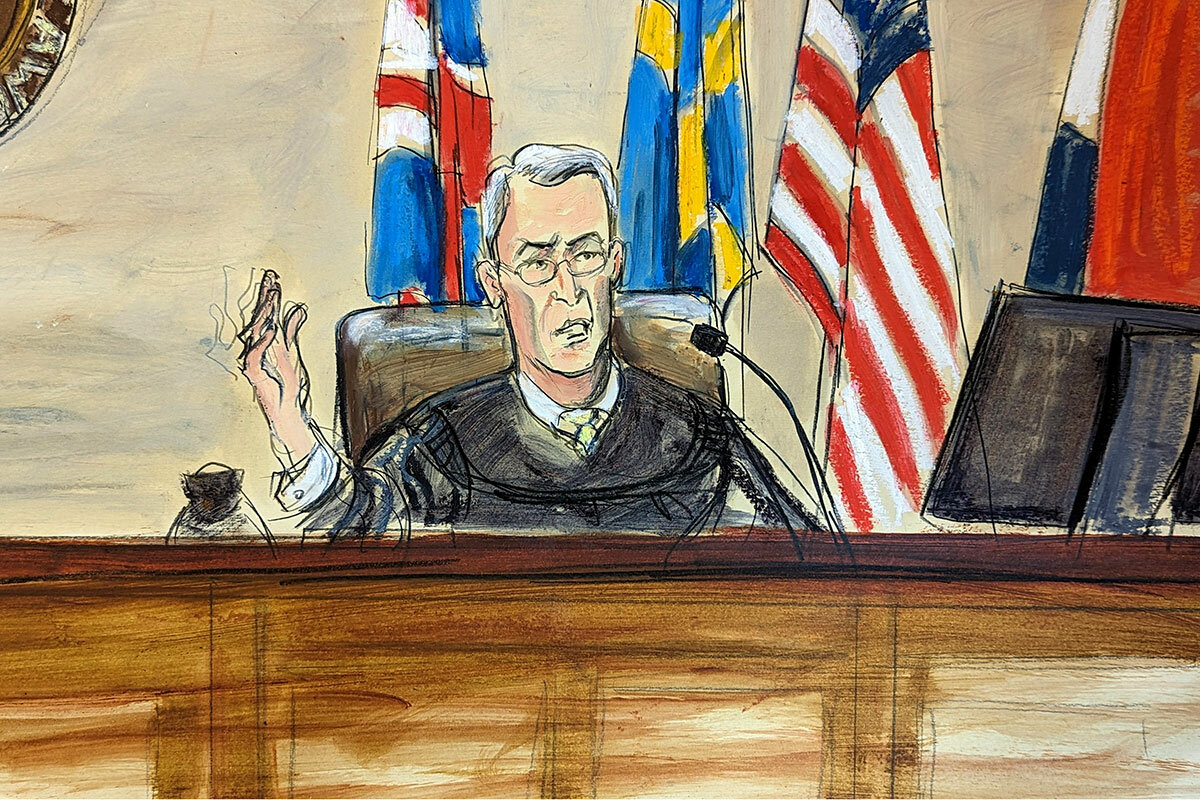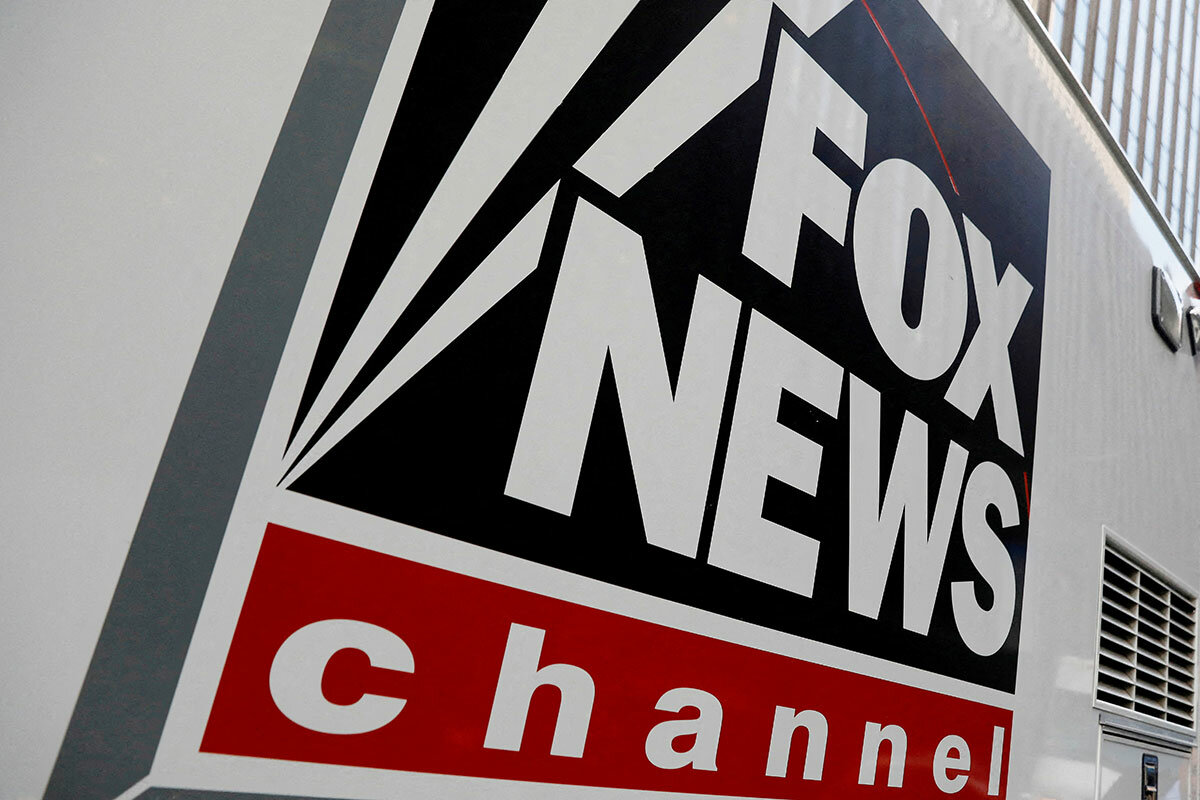Dominion v. Fox: Could case be weaponized against freedom of press?
Loading...
| New York
This week is set to bring a major test of modern freedom of the press in an era of disinformation.
The case of Dominion Voting Systems v. Fox News has its roots in conspiracy theories aired about voting machines after Joe Biden defeated Donald Trump in the 2020 presidential election.
Fox News argues that it was simply airing newsworthy allegations when it repeated those falsehoods. The defamation case brought by Dominion represents a “profound threat to the First Amendment,” Fox’s lawyers argued in a filing. If it loses, the network argues, it would be a journalistic disaster, opening networks and newspapers to all kinds of lawsuits.
Why We Wrote This
The truth is the North Star of journalism, and the Supreme Court has carved out broad protections to allow reporters to do their work. A defamation trial brought against Fox News could have wide-ranging ramifications.
In one respect, the outcome is not in doubt: A Delaware judge has already ruled that conspiracy theories about Dominion and its voting machines aired by Fox News are false and constitute defamation per se.
“The statements at issue were dramatically different than the truth,” said Superior Court Judge Eric Davis in a ruling. “In fact, although it cannot be attributed directly to Fox’s statements, it is noteworthy that some Americans still believe the election was rigged.”
But a high legal bar still remains: The company must prove that Fox acted with actual malice.
The $1.6 billion defamation suit, originally set to begin today, has been delayed reportedly while the parties consider whether to settle.
There is a lot more than $1.6 billion in damages at stake. For one thing, the Dominion case revisits the widespread conspiracy theories about election fraud, and the extent to which these lies and the broader problems of disinformation are threatening the country’s democratic institutions.
Some free speech advocates are concerned a jury ruling against Fox could indeed have a chilling effect on journalists’ constitutional duty to inform the public. But others maintain that giving its audience what it wanted, even at the expense of the truth, should render Fox News legally vulnerable.
“From my perspective, I think Dominion should win this case, because I do think this is a clear case of actual malice,” says Genelle Belmas, professor of journalism at the University of Kansas. “I think the judge laid it out with help from Dominion pretty clearly in this case. But in the larger sense, that doesn’t fix the problem of disinformation, and it could be weaponized, potentially weaponized, against press freedoms.”
“And if Fox wins, then, of course, that can be weaponized, too,” she continues, citing recent discussions about the case in which a Fox victory could be framed as vindicating the lies about the 2020 election.
The Dominion case comes at a moment when some thinkers and government officials – especially conservatives – are starting to question the extent of the news media’s special free speech protections.
New York Times v. Sullivan
For nearly 60 years, the nation’s legal traditions have more or less shielded news outlets from costly defamation lawsuits brought by anyone deemed a “public figure,” even when the information is false and damages that figure’s reputation.
As a technical legal term, “actual malice” has long set a sky-high bar for any public figure to sue a news organization for defamation. Coined in the seminal 1964 Supreme Court case New York Times v. Sullivan, the term was defined as publishing any defamatory information with “knowledge that it was false or with reckless disregard of whether it was false or not.” The Supreme Court has also defined actual malice as publishing a “calculated falsehood.”
“Times v. Sullivan does set a high bar,” says Professor Belmas. “When I talk to my students about it, I always give them the famous quote from Justice [William] Brennan’s majority decision, about the First Amendment being ‘a profound national commitment’ to a principle of free speech: ‘debate on public issues should be uninhibited, robust, and wide-open.’”
The case was not about the Times’ journalism, but about an advertisement placed by an Alabama civil rights organization, soliciting donations for Martin Luther King Jr.’s legal defense. The ad described clashes between protesters and police, and contained factual inaccuracies. A local official successfully sued the newspaper for libel under Alabama law.
The Supreme Court overturned the Alabama court’s decision 9-0, and used what was a minor case to proclaim this larger principle about the meaning of free speech and freedom of the press. Just the specter of defamation could cause a “chilling effect” on public debate, so in this case a unanimous Supreme Court set a significant legal barrier for public officials trying to sue news organizations.
In subsequent decisions, the Supreme Court expanded the scope of the actual malice standard to include “public figures,” as well as “limited public figures” who are thrust into the “vortex” of public debate.
“There’s a line in Sullivan that I really love that basically says, quoting from another case, ‘Whatever is added to the field of libel is taken from the field of free debate,’” says Andrew Geronimo, director of the First Amendment Clinic at Case Western Reserve University School of Law in Cleveland.
“But the idea of actual malice is that the news media should be able to talk freely about public figures, and most particularly in Times v. Sullivan, our government officials, and we should be able to get some things wrong,” he continues. “We should rely not upon a court punishing somebody with a monetary judgment, or an injunction barring them from speech. We should be relying upon more speech, and people should be able to win out in the marketplace of ideas.”
“Effective immunity from liability”?
Like the idea of a marketplace of ideas, however, the principles that underlie the special legal protections for news organizations have come under assault. The news media needs to be reined in, many believe, not afforded special privileges in the public square.
Florida Gov. Ron DeSantis, a Republican, has also taken direct aim at Times v. Sullivan, backing legislation that would make it easier for plaintiffs to prove actual malice. Calling for “media accountability,” he supports legislation that would also limit the definition of a “public figure,” allowing some plaintiffs to seek damages from the news media under the less stringent standard of negligence.
“We’ve seen over the last generation legacy media outlets increasingly divorce themselves from the truth and instead try to elevate preferred narratives and partisan activism over reporting the facts,” Governor DeSantis said during an event on defamation in February. “When the media attacks me, I have a platform to fight back. When they attack everyday citizens, these individuals don’t have the adequate resources to fight back. In Florida, we want to stand up for the little guy against these massive media conglomerates.”
At least two conservative Supreme Court justices have also attacked the Sullivan decision. Justice Clarence Thomas has criticized the actual malice standard from an originalist perspective, saying not only is the principle not in the Constitution, but it also has no historical precedents.
“The proliferation of falsehoods is, and always has been, a serious matter,” wrote Justice Thomas in a 2021 dissent from a case that dismissed the defamation claims of an Albanian public figure. “Instead of continuing to insulate those who perpetrate lies from traditional remedies like libel suits, we should give them only the protection the First Amendment requires.”
Justice Neil Gorsuch, too, says it is time to take another look at the actual malice standard. He argues that the news media landscape has changed so profoundly since the 1960s that media’s special protections – “an effective immunity from liability,” he wrote – may actually be dangerous in the digital age, in which there are far fewer economic resources to invest in reporting, fact-checking, and editorial oversight.
“What started in 1964 with a decision to tolerate the occasional falsehood to ensure robust reporting by a comparative handful of print and broadcast outlets has evolved into an ironclad subsidy for the publication of falsehoods by means and on a scale previously unimaginable,” he wrote.
There is a certain irony that many conservative thinkers want to scale back a protection that would help Fox in this case, and many conservative media outlets have criticized Governor DeSantis’ efforts.
But there has been a general consensus among legal experts that the evidence presented in the Dominion case just might be enough to clear the high bar of actual malice.
The case has unveiled a host of text messages and emails between Fox personalities and company executives that seem to reveal they did know the allegations were false, calling them everything from “absurd” to “bat---- crazy.”
“I do think this is a clear case of actual malice, which is either knowing falsity or acting with reckless disregard to the truth,” says Ms. Belmas at the University of Kansas. “But even if Dominion wins, it doesn’t fix the underlying problems with the media.”
Last week, the judge took the rare step of sanctioning Fox for withholding evidence during discovery, including recordings by a former Fox employee. And Judge Davis is weighing appointing a special master to investigate potential legal misconduct by the network’s attorneys. On Friday, Fox’s lawyers formally apologized to the judge.
A Fox victory could be less a win for free speech than a symbol of the need for more legal accountability for news organizations.
Mr. Geronimo agrees that the Dominion lawsuit offers “the most compelling evidence of actual malice that I think I’ve seen in a defamation case.” But there are also other compelling reasons to defend Fox’s coverage of issues brought forward by prominent political leaders, which are newsworthy in themselves, he says.
“I don’t think you could find anybody that would disagree that, if we’re using electronic voting systems and they’re compromised, we should be able to talk about that,” Mr. Geronimo says. “We should be able to raise concerns about foreign interference in our elections, whether or not these machines are capable of doing what they say they’re doing, whether or not they’re being tampered with.”








